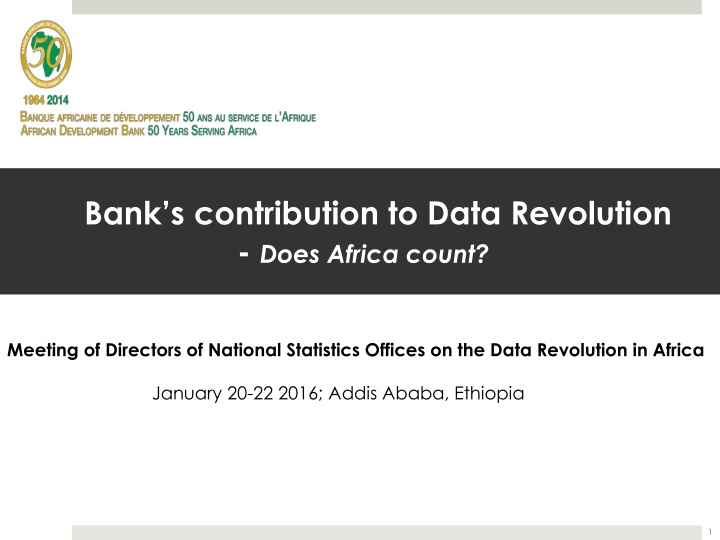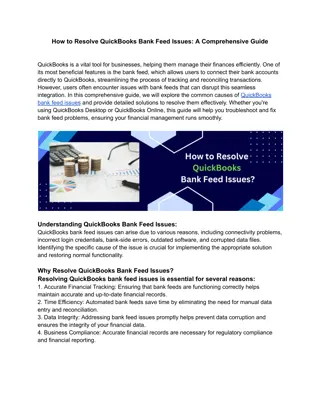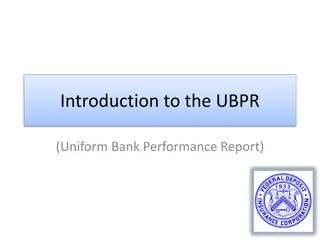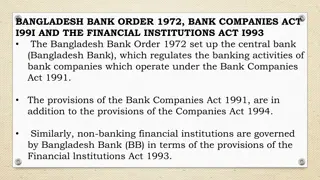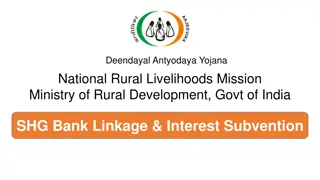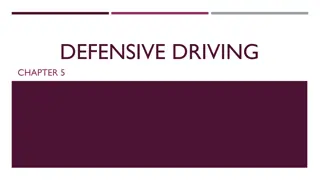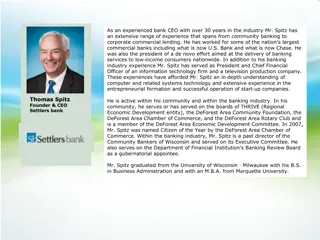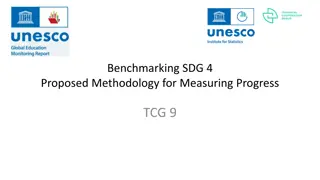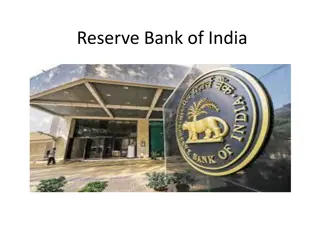Bank's Contribution to Data Revolution in Africa: Addressing Challenges and Driving Progress
The meeting of Directors of National Statistics Offices in Africa focused on the importance of data revolution and the strategic significance of high-quality data for the continent. Efforts are being made to meet the increasing demand for statistics and to align data initiatives with national development strategies and the Sustainable Development Goals.
Download Presentation

Please find below an Image/Link to download the presentation.
The content on the website is provided AS IS for your information and personal use only. It may not be sold, licensed, or shared on other websites without obtaining consent from the author.If you encounter any issues during the download, it is possible that the publisher has removed the file from their server.
You are allowed to download the files provided on this website for personal or commercial use, subject to the condition that they are used lawfully. All files are the property of their respective owners.
The content on the website is provided AS IS for your information and personal use only. It may not be sold, licensed, or shared on other websites without obtaining consent from the author.
E N D
Presentation Transcript
Banks contribution to Data Revolution - Does Africa count? Meeting of Directors of National Statistics Offices on the Data Revolution in Africa January 20-22 2016; Addis Ababa, Ethiopia 1
Table of Contents Introduction What is Data Revolution How the Bank has interpreted it Are data Strategically important for Africa Data requirements What are the data challenges Addressing the challenges What is the Bank doing SCB - Vehicle for statistical development Initiatives and innovations Tragedy for Africa & other regions High 5s priority agenda Take Aways 2
What is Data revolution? There are many definitions but would like to confine ourselves to a definition which is all encompassing: The Independent Advisory Group on the Data Revolution for sustainable development set up by the UN Secretary General defines it as: an explosion in volume & production of data matched by growing demand for data from all parts of society. Further that It must address global inequalities in access to & use of data & should aim to monitor development progress, accountable & foster sustainable development hold governments 3
How has the Bank interpreted it? ?? an explosion in volume & production ??? Data Revolution is not just about generating more data BUT It is about providing the right data to the right people at the right time and in the right format Give me what I need not what I want Trevor Manuel former Minister of Finance in South Africa Data must be transformed into information Information becomes knowledge, and that Knowledge that can drive actions needed to stimulate transformation development r eliminate poverty Resonates with the Bank s position A Knowledge Bank 4
Are data strategically Important for Africa? YES----is where needs are greatest High-quality, reliable and timely data are strategically important for Africa. Efforts are being made to meet the: Exponential demand for statistics, to inform evidence-based policy and decision-making processes for the government, private sector Needs for results measurements to monitor progress of national development strategies toward the Sustainable Development Goals Aligned to the Banks TYS 2013-2022 & the The High 5s 5
Data requirements for Data Revolution Data required: Africa 2063 agenda and SDGs (within the framework of the Bank TYS & High 5s) https://sustainabledevelopment.un.or g/focussdgs.html Scope of data requirements is challenging, and demands a significant scaling up of efforts to boost statistical capacity across the region 6
What are the data challenges? Despite the remarkable progress in African statistical systems over the past decade, three main fundamental challenges still exist: Weak organizational frameworks (incl. IT & legal infrastructure); and inadequate legal & Shortage of statistical manpower & skills to meet the ever-increasing demand for data ; Persistent need in the region for increased financial resources for statistical development & activities exist: 7
Addressing the challenges Sterling work has been done to build a firm foundation development in Africa over the past decade, including: for statistical Many regional & subregional bodies created in collaboration with UN Statistical Commission, subregional organizations and agencies; with development Overarching firm commitment to good governance and adherence to international standard & best practices. exist: 8
What is the Bank Doing? Bank s support for Statistics Over the past 10 years, the Bank has provided grants of over US$ 100 million for statistical capacity building in its member countries. Its support covers the following: development of statistical infrastructure (incl. National Statistical Development Strategies); harmonization of data generation and dissemination practices and standards across all its member countries; training programs for officials from member countries and Regional Economic Communities ; launching of the African Information Highway (or AIH) which includes the Open Data and the Data Portals; leading the International Comparison Program for Africa (or ICP); launching the Africa Infrastructure Knowledge program (or AIKP); support on the labor force surveys and households surveys ; development of the Strategy for improving Statistics for Food Security, Sustainable Agriculture and Rural Development including the Food Security Data Portal; Supported the wave of GDP re-basing exercise & development of business statistical registers 9
Vehicle for statistical Development SCB a vehicle for statistical development Implemented by the African Development Bank since 2004 in collaboration with major development partners Under the program AfDB has committed over US$ 100 million in grants to support: Strategy, organizational and methods development to promote statistical infrastructure Adaptation of international statistical standards to conditions in RMCs Harmonization of data generation and dissemination practices for data comparability across RMCs with the rest of the world Training of RMC and SRO officials to strengthen statistical capacity 10
Some of the initiatives under SCB The African Information Highway (AIH) Launched in 2012 Data Portals/Open Data systems with common IT Platforms installed in all 54 African countries and 16 African sub- regional and regional organizations One-stop shop to all data necessary for managing and monitoring development results in African countries Advocacy for Population and Housing Censuses Undertaken by ASSD Resulted in the highest participation by RMCs in any round to date, with 50 African countries participating in the 2010 round of World Population and Housing Census by end-2014 compared to 35 in 2000 round International Comparison Program for Africa (ICP) Managed by AfDB since 2002to measure price levels and economic aggregates in real terms across Africa Capacity-building platform for price statistics, national accounts and related statistics and adopting best practices in economic and social statistics Civil Registration and Vital Statistics Implemented by AfDB in collaboration with other Pan Africa institutiions 11
Initiatives under SCB Program (cont.) Africa Infrastructure Knowledge Program (AIKP) Adopts a longer-term perspective in providing a framework for generating country-level knowledge on infrastructure on a more sustainable basis Provides benchmarks for measuring improvements in infrastructure services to ensure that finances are directed where they will have the greatest impact Labor Statistics: the Bank assists RMCs to improve their labor statistics through: operational and methodological guidebooks for conducting labor force and household surveys Assisting countries with the undertaking of labor surveys and labor statistics classifications Providing training for African sampling statisticians Improving Data on Food Security, Sustainable Agricultural and Rural Development Under the Global Strategy for Improving Statistics for Food Security, Sustainable Agriculture & Rural Development, the Action Plan for Africa was formulated by AfDB, UNECA, & the FAO Rebasing of GDP & reviews Several countries already assisted with GDP rebasing by AfDB in collaboration with the World Bank and IMF, with 35 countries due to rebase in the near future Peer review of national accounts Preparation of Country Statistical Profile (CStP) diagnostic and programming tool for evaluating the national and sector development strategies 12
Recent Innovations in Methods of Data Collection and Management Under the AIH initiative, the AfDB promotes the use of advanced technology through: Quick surveys using mobile phones, hand held devises and tablets Implemented on pilot survey of youth unemployment in DRC, Tunisia and a CWIQ survey in Uganda using a combination of telephone calls from call centers and tablets Weekly data collection of prices for food items AfDB in collaboration with EU s Joint Research Center currently undertaken in 40 African countries using its AIH web platform Data Collection undertaken by national agricultural extension systems Expand on weekly food price data collection using mobile phones and tablets technology in multiple locations using extension officers 13
Recent Innovations in Methods of Data Collection and Management (cont.) Data Dissemination to Farmers Providing weekly market food price data to farmers in distant markets through cell phone Creation of Farmers Registries Pilot phase initiated in Zambia with records on over 10,000 farmers collected & to be initiated in Tunisia and expanded progressively to other countries. Digital Farm Mapping Provide maps of all farms or agricultural land in participating countries Overall will provide ideal frames for Agriculture. Related surveys 14
Tragedy for Africa & other developing regions Real Tragedy... Rear View Mirror is shattered .. Playing Catch up .. New methodologies & guidelines i.e MDGs>>SDGs Moving target --- new indicators ..Difficulties to cope with pace of development Because of challenges countries face.. Inadequate legal & institutional framework Poor infrastructure facilities Inadequate trained personnel Poor funding 15
Opportunity Playing catch up can be an opportunity Take advantage of being latecomers Not doing same the way as others have done Learning from other s mistakes Leapfrog to latest solutions Take note of the existing ecosytems Harnessing all this . for sustainable development 16
Take Aways.. 18
Take Aways.. What have we established about Data Revolution: Its about.. Fixing basic nuts & bolts in the data generation chain System-wide coordination & management Investing in human resources development & production of statistics Data Dissemination & Use Going forward The Bank through its SCB program will continue to provide support to build sustainable statistical capacity in RMCs to respond to SDGs & the High 5s (light up & power Africa; Feed Africa; Integrate Africa; Industrialize Africa; and Improve the quality of life for the people of Africa) EASTA will continue to work with operation departments to identify resources from projects to support data generation in RMCs ESTA aspires to operate like a sector dept., to enable more resources to be allocated to support statistical activities in RMCs 19
THANK YOU 20
